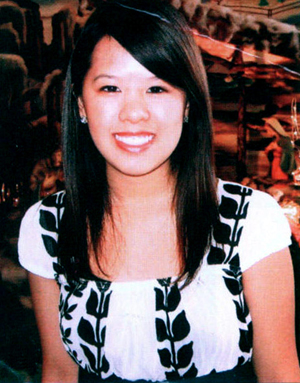
Nina Pham
By Emily Schmall and Nomaan Merchant
Associated Press
DALLAS (AP) — A nurse who became infected with Ebola while treating the first patient diagnosed in the U.S. said Tuesday that she was “‘doing well,” while the World Health Organization projected that West Africa could see up to 10,000 new infections a week within two months.
Nurse Nina Pham was among about 70 staff members at Texas Health Presbyterian Hospital who cared for Thomas Eric Duncan, according to medical records.
The 26-year-old nurse was in the Liberian man’s room often, from the day he was placed in intensive care until the day before he died last week.
“‘I’m doing well and want to thank everyone for their kind wishes and prayers,” Pham said in a statement issued by the hospital, which said doctors were hopeful that she would recover.
She and other health care workers wore protective gear, including gowns, gloves, masks and face shields — and sometimes full-body suits — when caring for Duncan, but she became the first person to contract the disease within the United States. Duncan died Wednesday.
Pham understood the risks and tried to reassure her family that she would be safe, according to a family friend.
When Pham’s mother learned her daughter was caring for Duncan, Pham told her: “‘Don’t worry about me,” Christina Tran told The Associated Press on Monday.
Pham went to the hospital Friday night after finding she had a fever.
The health organization’s assistant director-general, Dr. Bruce Aylward, gave the infection projection during a news conference in Geneva and confirmed the death rate in the current outbreak has risen to 70 percent. Previously, the WHO had estimated the Ebola mortality rate at around 50 percent.
If the world’s response to the crisis isn’t stepped up within 60 days, “‘a lot more people will die,” Aylward said.
Meanwhile in Berlin, a U.N. medical worker infected with Ebola in Liberia died. The 56-year-old man, whose name has not been released, died overnight of the infection, the St. Georg hospital in Leipzig announced Tuesday.
Leipzig authorities said the man, who was from Sudan, would be cremated. Islam discourages cremation, but the city said it had no choice.
“‘Ebola can remain infectious for weeks, so a normal burial is impossible,” city spokesman Matthias Hasberg said.
The patient was kept in an isolation ward equipped with negative-pressure rooms that are hermetically sealed and can only be accessed through airlocks.
At least six staff cared for the man around the clock, going through as many as 30 pairs of surgical gloves an hour and up to 100 protective suits a day, Minde said.
Pham’s parents live in Fort Worth, where they are part of a closely-knit, deeply religious community of Vietnamese Catholics. Members of their church held a special Mass for her Monday.
At the hospital, she received a plasma transfusion from a doctor who beat the virus.
Jeremy Blume, a spokesman for the nonprofit medical mission group Samaritan’s Purse, confirmed that the plasma donation came from Kent Brantly, the first American to return to the U.S. from Liberia to be treated for Ebola. Brantly received an experimental treatment and fought off the virus, and has donated blood to three others, including Pham.
Brantly said in a recent speech that he also offered his blood for Duncan, but that their blood types didn’t match.
Since Pham tested positive for Ebola, public-health authorities have intensified their monitoring of other hospital workers who cared for Duncan.
Centers for Disease Control and Prevention Director Tom Frieden said he would not be surprised if more fall ill because Ebola patients become more contagious as the disease progresses.
Frieden has said a breach of protocol led to the nurse’s infection, but officials are not sure what went wrong. Pham has not been able to point to any specific breach.
Among the things the CDC will investigate is how the workers took off protective gear, because removing it incorrectly can lead to contamination. Investigators will also look at dialysis and intubation — the insertion of a breathing tube in a patient’s airway. Both procedures have the potential to spread the virus. (end)
Schmall reported from Fort Worth, Texas. Associated Press writers Mike Stobbe in New York, Martha Mendoza, Maud Beelman and Alex Sanz in Dallas and Tammy Webber in Chicago also contributed to this report.



